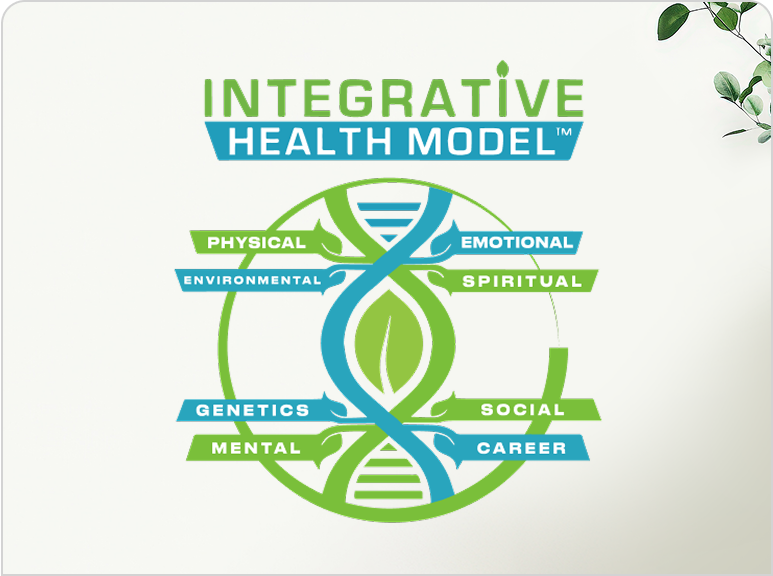Functional Medicine Approach to Brain Fog

The functional medicine approach to brain fog focuses on identifying and treating the root causes like gut imbalances, hormone dysfunction, inflammation, and nutrient deficiencies rather than just masking symptoms. It views the body as an interconnected system, using advanced testing and personalized plans to restore mental clarity. By optimizing gut health, balancing hormones, improving sleep, reducing toxic load, and supporting nutrition, functional medicine offers a holistic and lasting path to clear thinking.
Brain fog affects millions of people every day. You might feel like you're thinking through mud, can't find the right words, or forget simple things. This isn't normal, and you don't have to live with it. Recent studies show that 28.2% of people report experiencing brain fog, making it one of the most common health complaints today.
This article will show you how functional medicine takes a different approach to brain fog. You'll learn about the main causes, how your gut connects to your brain, and natural ways to get your sharp thinking back. By the end, you'll understand why your brain feels foggy and have a clear plan to fix it.
What Is Brain Fog and Why Does It Happen?
Brain fog isn't a real medical disease. It's a term doctors use to describe a group of symptoms that make thinking hard. Think of it like having a dirty windshield on your car - everything looks blurry and unclear.
Common Signs of Brain Fog
People with brain fog often feel like they have:
- Trouble finding words when talking
- Can't focus on tasks for long
- Forget things they just learned
- Feel mentally tired all the time
- Hard time making decisions
- Need to read things twice to understand
The Functional Medicine Difference
Regular doctors might tell you brain fog is just stress or getting older. They often prescribe antidepressants or sleeping pills without finding out why you have brain fog in the first place.
A functional medicine approach to brain fog involves identifying potential contributing factors and addressing them with a personalized plan based on a detailed intake questionnaire and specialized lab results. This means looking at your whole body as one connected system instead of treating just the symptoms.
Functional medicine doctors spend time with you. They ask about your food, sleep, stress, and past health problems. They run special tests to see how your body works on the inside. This helps them find the real reason your brain feels foggy.
The Gut-Brain Connection: Your Second Brain
Your gut and brain are closely connected. In fact, scientists call your gut your "second brain" because it has its own nervous system with over 100 million nerve cells.
How Your Gut Affects Your Brain
70% of your serotonin is made in your gut, and serotonin is a brain chemical that helps you feel good and think clearly. When your gut isn't healthy, it can't make enough serotonin, which leads to brain fog.
Your gut also talks to your brain through something called the vagus nerve. This is like a highway that carries messages back and forth. According to Johns Hopkins Medicine, the enteric nervous system in your gut contains over 100 million nerve cells and communicates directly with your brain. When your gut is inflamed or has bad bacteria, it sends signals to your brain that cause fog and fatigue.
Common Gut Problems That Cause Brain Fog
Several gut issues can make your brain feel cloudy:
Small Intestinal Bacterial Overgrowth (SIBO) In SIBO, the bacteria can interact with certain foods to release hydrogen sulfide gas which can directly cause brain fog and fatigue. This happens when bad bacteria grow in the wrong part of your intestines.
Leaky Gut Syndrome When your gut lining gets damaged, toxins can leak into your blood and travel to your brain. These toxins can then travel throughout the body via blood vessels and trigger an immune response which results in inflammation—which itself contributes to anxiety symptoms like brain fog or fatigue.
Food Sensitivities When you eat foods your body doesn't like, it causes inflammation. This inflammation can travel to your brain and make thinking harder. Common problem foods include gluten, dairy, and sugar.
Blood Sugar and Brain Health
Your brain needs steady fuel to work well. That fuel is glucose (blood sugar). When your blood sugar goes up and down like a rollercoaster, your brain can't function properly.
How Blood Sugar Affects Thinking
Your brain must have glucose (blood sugar) to function. In order for you to be able to think clearly, your brain depends on this vital fuel. When blood sugar drops too low, the first symptom is often brain fog, followed by feeling irritable and shaky.
Many people eat too much sugar and refined carbs, which causes their blood sugar to spike and crash. Each crash makes brain fog worse.
Signs Your Blood Sugar Is Causing Brain Fog
You might have blood sugar problems if you:
- Feel tired after eating
- Get "hangry" when hungry
- Crave sweets in the afternoon
- Feel dizzy when standing up
- Wake up tired even after sleeping
Fixing Blood Sugar Naturally
The best way to steady your blood sugar is through diet changes:
- Eat protein with every meal
- Choose whole foods over processed ones
- Avoid sugary drinks and snacks
- Eat smaller meals more often
- Add healthy fats like avocado and nuts
Hormones and Brain Function
Your hormones are like messengers that tell your body what to do. When they're out of balance, your brain doesn't get the right signals, leading to fog and fatigue.
Key Hormones That Affect Brain Health
Thyroid Hormones Your thyroid controls how fast your body works. When it's too slow (hypothyroid), everything slows down, including your thinking. Thyroid hormone imbalances have been shown to cause inflammatory-immune responses that can fog your brain.
Stress Hormones (Cortisol) Chronic stress makes your adrenal glands pump out too much cortisol. This stress hormone can damage brain cells and make concentration difficult. Dysfunction in your adrenal-based circadian rhythm can manifest as adrenal fatigue, when the stress hormone cortisol runs wild, depressing your immune system.
Sex Hormones (Estrogen, Testosterone) Fluctuating hormone levels, particularly estrogen shifts, during this time may affect energy levels and contribute to symptoms such as forgetfulness, difficulty concentrating, and brain fog. This is why many women notice brain fog during menopause or their monthly cycle.
Natural Ways to Balance Hormones
Supporting your hormones naturally can clear brain fog:
- Get 7-9 hours of quality sleep
- Manage stress through deep breathing or meditation
- Exercise regularly but don't overdo it
- Eat foods rich in healthy fats
- Limit caffeine and alcohol
- Consider adaptogenic herbs like ashwagandha
Working with a naturopathic doctor can help you test your hormone levels and create a plan to balance them naturally.
Inflammation: The Silent Brain Fog Trigger
Inflammation is your body's way of fighting off harmful things. But when inflammation doesn't turn off, it can damage your brain and cause persistent fog.
How Inflammation Causes Brain Fog
The microRNA-155 molecule is elevated with high inflammation and ends up creating gaps in the blood-brain barrier that lets bacteria and other toxins slip through. Your brain has to work overtime to fight these invaders, which causes inflammation inside your brain.
Recent research shows a direct link between inflammation and brain fog. A new study has shown what we have known for some time in functional medicine: Chronic inflammation causes brain fog and mental sluggishness.
Common Sources of Inflammation
Many things in modern life cause chronic inflammation:
- Processed and fast foods
- Too much sugar
- Food allergies and sensitivities
- Chronic stress
- Poor sleep
- Environmental toxins
- Hidden infections
Fighting Inflammation Naturally
You can reduce inflammation through simple lifestyle changes:
Anti-Inflammatory Foods
- Fatty fish like salmon and sardines
- Leafy green vegetables
- Berries and colorful fruits
- Turmeric and ginger
- Green tea
- Olive oil and avocados
Lifestyle Changes
- Regular exercise (but not too intense)
- Stress management techniques
- Good sleep habits
- Time in nature
- Deep breathing exercises
Environmental Toxins and Brain Health
We're exposed to thousands of chemicals every day. While our bodies can handle some toxins, too many can overwhelm our natural detox systems and cause brain fog.
How Toxins Affect Your Brain
Many patients who come to me with brain fog symptoms very often have a high toxic burden. Our bodies are equipped to detoxify harmful materials that enter our body, but if our organs (like our liver) are overburdened with toxins from our environment, then they do not perform their other duties well and our health can suffer.
Toxins can cross the blood-brain barrier and damage brain cells directly. They can also cause inflammation that leads to brain fog.
Common Environmental Toxins
Heavy Metals Lead, mercury, aluminum, and cadmium can build up in your brain over time. These often come from:
- Old paint and pipes
- Fish high in mercury
- Aluminum cookware
- Contaminated water
Mold Toxins Mold contamination can cause a myriad of symptoms ranging from joint pain to respiratory problems to debilitating brain fog. Mold can grow in homes with water damage, creating toxins that affect your brain.
Chemical Toxins Pesticides, plastics, and cleaning products contain chemicals that can disrupt brain function.
Supporting Natural Detoxification
Your body has built-in detox systems, mainly your liver. You can support these systems by:
- Drinking plenty of clean water
- Eating foods that support liver function (broccoli, beets, garlic)
- Sweating through exercise or saunas
- Getting enough fiber to help eliminate toxins
- Reducing exposure to chemicals when possible
Environmental medicine specialists at practices like Cutler Integrative Medicine can test for toxic overload and create safe detox programs.
Infections and Brain Fog
Hidden infections in your body can cause chronic inflammation that leads to brain fog. These infections might not make you feel obviously sick, but they drain your energy and cloud your thinking.
Common Hidden Infections
Chronic Viral Infections Low-grade chronic viral infections such as Epstein-Barr virus (EBV) are linked to a wide range of inflammatory problems like chronic fatigue syndrome. Many people carry viruses like EBV without knowing it, and stress can reactivate them.
Fungal Overgrowth Candida yeast naturally lives in your body, but it can overgrow and cause problems. Candida is a fungus that hides in your mouth and gut. It can overgrow from stress, from a high-sugar diet, or from antibiotic use that leads to an imbalance of "good" versus "bad" bacteria in the gut.
Bacterial Infections H. pylori bacteria in the stomach and other bacterial overgrowths can cause inflammation that affects brain function.
Addressing Infections Naturally
Natural approaches to dealing with infections include:
- Supporting your immune system with proper nutrition
- Taking targeted antimicrobial herbs
- Restoring healthy gut bacteria with probiotics
- Managing stress to prevent infection reactivation
- Getting adequate sleep for immune function
Nutrient Deficiencies That Cause Brain Fog
Your brain needs specific nutrients to function well. When you're low in key vitamins and minerals, thinking becomes difficult.
Critical Brain Nutrients
B Vitamins B vitamins help make brain chemicals and protect nerve cells. Boost your Vitamin B intake to protect the brain, enhance communication and lower the level of homocysteine in the brain. B12 deficiency is especially common and can cause severe brain fog.
Vitamin D Boosting your Vitamin D intake to help clear brain fog, lift depression and enhance memory and clarity. Most people don't get enough vitamin D, especially in winter months.
Omega-3 Fatty Acids Consuming more omega-3 essential fatty acids – combats fatigue, poor memory, mood swings, and depression. Your brain is 60% fat, and it needs healthy fats to work properly.
Magnesium Taking magnesium to calm the central nervous system, block stress hormones and combat migraines. Magnesium deficiency is very common and can cause brain fog, anxiety, and poor sleep.
Getting Nutrients Through Food
The best way to get brain nutrients is through whole foods:
- Fish for omega-3s and B vitamins
- Leafy greens for folate and magnesium
- Organ meats for B vitamins and iron
- Nuts and seeds for magnesium and healthy fats
- Colorful vegetables for antioxidants
Sometimes supplements are needed, especially if you have absorption problems or severe deficiencies. A functional medicine doctor can test your nutrient levels and recommend the right supplements.
Sleep and Brain Health
Good sleep is when your brain cleans itself. If you don't sleep well, toxins and waste products build up in your brain, causing fog and fatigue.
How Sleep Affects Your Brain
The body and brain undergo a self-cleaning cycle of removing waste during sleep. When this process is disrupted due to lack of quality sleep, it may contribute to brain fog. During deep sleep, your brain literally washes itself with fluid that removes toxins.
Poor sleep also affects hormones, blood sugar, and inflammation - all things that can cause brain fog.
Signs of Poor Sleep Quality
You might have sleep problems if you:
- Take more than 30 minutes to fall asleep
- Wake up multiple times during the night
- Don't feel rested in the morning
- Need caffeine to function
- Feel tired during the day
Natural Sleep Solutions
Improving sleep quality can dramatically reduce brain fog:
Sleep Hygiene
- Go to bed and wake up at the same time every day
- Keep your bedroom cool, dark, and quiet
- Avoid screens for 1-2 hours before bed
- Don't eat large meals close to bedtime
Natural Sleep Aids
- Magnesium supplements
- Chamomile tea
- Melatonin (short-term use)
- Relaxation techniques
- Essential oils like lavender
If you snore or stop breathing during sleep, you might have sleep apnea. Sleep apnea is very common and is characterized by daytime sleepiness and mental fatigue. This serious condition needs medical treatment.
Stress Management for Clear Thinking
Chronic stress is one of the biggest causes of brain fog. When you're stressed all the time, your body stays in "fight or flight" mode, which isn't good for clear thinking.
How Stress Affects Your Brain
Stress hormones like cortisol can damage brain cells and shrink the part of your brain responsible for memory and learning. Chronic stress also causes inflammation and disrupts sleep, making brain fog worse.
Effective Stress Management Techniques
Mindfulness and Meditation Even 10 minutes of daily meditation can reduce stress hormones and improve brain function. Start with simple breathing exercises or use a meditation app.
Regular Exercise Physical activity reduces stress hormones and increases brain chemicals that improve mood and thinking. You don't need intense workouts - even walking helps.
Nature Time Spending time outdoors, especially in green spaces, naturally reduces stress and improves mental clarity.
Social Connection Having supportive relationships helps buffer against stress. Make time for friends and family, or consider joining support groups.
Practices that offer holistic approaches can help you develop personalized stress management plans.
Functional Medicine Testing for Brain Fog
To find the root cause of your brain fog, functional medicine doctors use advanced tests that look deeper than standard blood work.
Comprehensive Blood Panels
These tests check for:
- Complete blood count and metabolic panel
- Thyroid function (TSH, T3, T4, reverse T3)
- Nutrient levels (B12, folate, vitamin D, magnesium)
- Inflammatory markers (CRP, ESR)
- Blood sugar regulation (glucose, insulin, HbA1c)
Specialized Testing
Gut Health Testing
- Comprehensive stool analysis
- SIBO breath tests
- Food sensitivity panels
- Intestinal permeability tests
Hormone Testing
- Adrenal function tests
- Sex hormone panels
- Cortisol rhythm testing
Toxin Testing
- Heavy metal testing
- Mold toxin testing
- Organic acid tests
Infection Testing
- Chronic virus panels (EBV, CMV, HHV-6)
- Bacterial overgrowth tests
- Parasitology testing
These tests help create a complete picture of what's causing your brain fog so treatment can target the real problems.
Natural Treatment Approaches
Once the root causes are identified, functional medicine uses natural therapies to restore brain health.
Dietary Interventions
Elimination Diets Removing common trigger foods like gluten, dairy, and sugar for 4-6 weeks can identify sensitivities causing brain fog. Following an elimination diet helps us take a systematic approach to identifying food intolerances that can cause inflammation throughout the body.
Anti-Inflammatory Diet Focus on whole foods that fight inflammation:
- Wild-caught fish
- Organic vegetables and fruits
- Healthy fats like olive oil and avocados
- Herbs and spices like turmeric and ginger
Blood Sugar Balancing Eating protein and healthy fats with each meal helps keep blood sugar steady and prevents brain fog episodes.
Targeted Supplementation
Based on test results, functional medicine doctors might recommend:
Brain-Supporting Supplements
- Omega-3 fatty acids for brain inflammation
- B-complex vitamins for nerve function
- Magnesium for stress and sleep
- Vitamin D for immune function
Gut-Healing Supplements
- Probiotics to restore healthy bacteria
- Digestive enzymes to improve nutrient absorption
- L-glutamine to heal intestinal lining
- Anti-inflammatory herbs like turmeric
Detox-Supporting Supplements
- Milk thistle for liver support
- N-acetylcysteine (NAC) for antioxidant protection
- Chlorella for heavy metal binding
Lifestyle Modifications
Stress Reduction
- Regular meditation or prayer
- Gentle exercise like yoga or walking
- Time management techniques
- Boundary setting
Sleep Optimization
- Consistent sleep schedule
- Bedroom environment improvements
- Natural sleep aids if needed
- Treatment of sleep disorders
Movement and Exercise Regular physical activity improves blood flow to the brain, reduces inflammation, and supports detoxification. Even light exercise like walking can help clear brain fog.
Advanced Functional Medicine Therapies
For people with severe brain fog, advanced therapies might be helpful.
IV Nutrient Therapy
IV therapy delivers nutrients directly into your bloodstream, bypassing digestive absorption problems. This can quickly address severe nutrient deficiencies contributing to brain fog.
Common IV nutrients for brain health include:
- B vitamins for nerve function
- Vitamin C for antioxidant protection
- Magnesium for stress and sleep
- Glutathione for detoxification
Detoxification Protocols
For people with high toxic burdens, supervised detox programs can help remove accumulated toxins safely. These programs typically include:
- Targeted supplements to support liver function
- Sauna therapy to promote toxin elimination
- Chelation therapy for heavy metals (when appropriate)
- Dietary modifications to reduce toxic exposure
Biocharger Therapy
Some functional medicine clinics offer advanced therapies like biocharger treatment that use subtle energy to support cellular function and reduce inflammation.
Creating Your Brain Fog Recovery Plan
Recovering from brain fog takes time and patience. Here's how to create a plan that works:
Step 1: Work with a Qualified Provider
Find a functional medicine doctor who specializes in brain health. They can run proper tests and create a personalized treatment plan.
Step 2: Start with the Basics
Before diving into complex treatments, focus on:
- Improving your diet
- Getting better sleep
- Managing stress
- Taking basic supplements if needed
Step 3: Address Root Causes
Based on your test results, work on the specific issues causing your brain fog:
- Heal your gut if you have digestive problems
- Balance hormones if they're out of whack
- Support detoxification if you have high toxic load
- Treat infections if they're found
Step 4: Track Your Progress
Keep a journal of your symptoms, energy levels, and mental clarity. This helps you and your doctor see what's working and what needs adjustment.
Step 5: Be Patient and Persistent
Brain fog didn't develop overnight, and it won't disappear immediately. Most people start feeling better within 4-8 weeks of starting treatment, but full recovery can take 6-12 months or longer.
Working with Healthcare Providers
The best approach to brain fog often involves working with multiple healthcare providers who can address different aspects of your health.
Your Healthcare Team
Functional Medicine Doctor The leader of your team who looks at the big picture and coordinates care. They run comprehensive tests and create overall treatment plans.
Naturopathic Doctor Specializes in natural treatments and can prescribe herbs, supplements, and other natural therapies. Naturopathic treatment focuses on supporting your body's natural healing abilities.
Nutritionist or Dietitian Helps you implement dietary changes and meal planning to support brain health.
Mental Health Counselor Addresses stress, anxiety, and depression that might contribute to or result from brain fog.
Questions to Ask Your Doctor
When working with healthcare providers, ask:
- What tests do you recommend to find the root cause?
- How long will it take to see improvement?
- What are the side effects of recommended treatments?
- How will we track progress?
- What can I do at home to support treatment?
Prevention Strategies
Once you've cleared your brain fog, you'll want to keep it from coming back. Prevention focuses on maintaining the healthy habits that restored your mental clarity.
Daily Brain Health Habits
Morning Routine
- Start with protein-rich breakfast
- Get sunlight exposure to regulate circadian rhythms
- Practice gratitude or meditation
- Take recommended supplements
Throughout the Day
- Stay hydrated with clean water
- Eat regular meals with protein and healthy fats
- Take breaks from screens and mental work
- Practice deep breathing when stressed
Evening Routine
- Limit screens 1-2 hours before bed
- Take a warm bath or shower
- Practice relaxation techniques
- Keep consistent bedtime
Long-Term Maintenance
Regular Testing Get follow-up lab work every 6-12 months to catch problems early.
Ongoing Education Stay informed about brain health and functional medicine developments.
Community Support Connect with others who understand the journey of recovering from brain fog.
Professional Relationships Maintain relationships with healthcare providers who understand functional medicine approaches.
When to Seek Immediate Medical Attention
While brain fog is usually not an emergency, certain symptoms require immediate medical attention:
- Sudden, severe confusion
- Memory loss that affects daily function
- Difficulty speaking or understanding speech
- Vision changes or loss
- Severe headaches unlike any you've had before
- Fever with confusion
- Signs of stroke or seizure
These symptoms could indicate serious medical conditions that need emergency treatment.
The Future of Brain Fog Treatment
Research into brain fog is advancing rapidly, especially since COVID-19 brought attention to cognitive symptoms. Scientists are discovering new connections between the gut and brain, developing better tests for inflammation, and creating more targeted treatments.
Emerging Research Areas
Microbiome Therapy Scientists are developing specific probiotic strains to target brain fog and cognitive symptoms.
Precision Medicine Genetic testing is helping doctors predict who's most likely to develop brain fog and which treatments will work best.
Inflammation Targeting New natural compounds are being studied for their ability to reduce brain inflammation without side effects.
Technology-Assisted Recovery Apps and devices are being developed to help people track symptoms, manage stress, and optimize brain health.
Final Thoughts
Brain fog doesn't have to be a permanent part of your life. The functional medicine approach offers hope by looking beyond symptoms to find and fix the real problems causing your mental cloudiness.
By addressing gut health, balancing hormones, reducing inflammation, and supporting your body's natural healing processes, you can restore the clear thinking you deserve. The key is working with knowledgeable healthcare providers who understand that brain fog is a symptom, not a diagnosis, and that your body has the ability to heal when given the right support.
Remember that recovery takes time, and everyone's journey is different. Be patient with yourself as you work through the process of identifying and addressing the root causes of your brain fog. With persistence and the right approach, you can get your mental clarity back and prevent brain fog from returning.
The investment in your brain health is one of the most important investments you can make. Your ability to think clearly affects every aspect of your life - your relationships, work, and overall happiness. By taking a functional medicine approach to brain fog, you're not just treating symptoms; you're optimizing your brain for long-term health and vitality.
If you're ready to start your journey toward clearer thinking, consider working with healthcare providers who specialize in functional medicine approaches to brain health. With proper testing, personalized treatment plans, and commitment to the process, you can overcome brain fog and reclaim your mental sharpness.
Ready to clear your brain fog naturally? Contact Cutler Integrative Medicine to learn how functional medicine can help restore your mental clarity and overall health.
You May Also Like




.png)

.png)



%201.png)



.png)

.png)



.png)
.png)
.png)
.png)
.png)
.png)
.png)
.png)

.png)
.png)
.png)
.png)

.png)
.png)

.png)
.png)






.png)




.png)
.png)
.png)

.png)

.png)